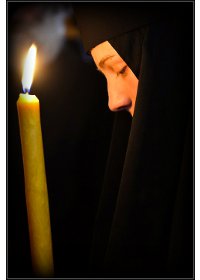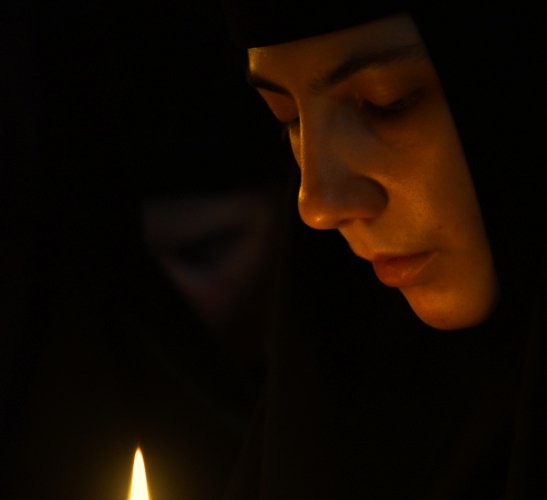In order to put a firm end to fantasy, the Orthodox ascetic tradition, unlike the Catholic one, forbids any attempt to imagine even the apparently divine subjects like The Judgment Day, Christ on the throne or Christ hanging on the Cross[5]. ”He who sees nothing when he prays, sees God” said St. Symeon the New Theologian. Through this incessant practice, by the participation of the Holy Spirit, the ascetic comes to the point of not having even dreams anymore, which means he is able to control even the subconscious motions during sleep. It is clear then why such a man controls very easily the brutal impulses of bodily lust, cutting them off completely.
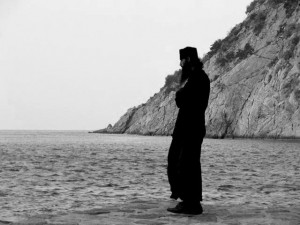 The struggle with the passions is not done at random and not everybody is successful. On the contrary, very few, even among monks, reach the heights described above. The ascetic is, first of all, an expert of the human soul, a great psychologist and even psychiatrist. In order to attain to this knowledge he studies the treatises of astonishing precision of his predecessors, which are included in the Philokalia (an encyclopedia of monastic living) and in other works. Therefore no ignorant novice can penetrate, and especially maintain himself in this dangerous space of virginity for Christ; fact proved by the many cases of insanity in which fall those trying to achieve it without knowledgeable guides, mostly laymen who attempt to imitate monks after reading, without proper guidance, the many books available today. Indeed, among them there are many in sorrows, cruelly tormented by melancholy and irritability, which are inevitable fruits of the passion of lust. But this doesn’t occur because virginity is impossible, but because they practice it wrongly, praying incorrectly and proudly thinking that they are achieving something great. Therefore God takes away His grace, without which we can do nothing (John 15,5) leaving man by himself, with his wretched weapons, against the irrational fury of this monstrous passion.
The struggle with the passions is not done at random and not everybody is successful. On the contrary, very few, even among monks, reach the heights described above. The ascetic is, first of all, an expert of the human soul, a great psychologist and even psychiatrist. In order to attain to this knowledge he studies the treatises of astonishing precision of his predecessors, which are included in the Philokalia (an encyclopedia of monastic living) and in other works. Therefore no ignorant novice can penetrate, and especially maintain himself in this dangerous space of virginity for Christ; fact proved by the many cases of insanity in which fall those trying to achieve it without knowledgeable guides, mostly laymen who attempt to imitate monks after reading, without proper guidance, the many books available today. Indeed, among them there are many in sorrows, cruelly tormented by melancholy and irritability, which are inevitable fruits of the passion of lust. But this doesn’t occur because virginity is impossible, but because they practice it wrongly, praying incorrectly and proudly thinking that they are achieving something great. Therefore God takes away His grace, without which we can do nothing (John 15,5) leaving man by himself, with his wretched weapons, against the irrational fury of this monstrous passion.
Man cannot stand by himself against this unleashed ocean, “cause love is as strong as death, and jealousy as terrible as hell” (The Songs of Songs, 8.6). Therefore it is not easy to explain the phenomenon of joyous abstinence to the unfaithful who cannot accept the work of the Holy Spirit in man. The ascetic has the organic and psychological formation of any other man, so he is vulnerable. But he is protected as if under a bell by the gift of the Spirit. All his struggles are meant to prevent the repelling of the gift once he has earned it. More precisely, the struggles have as their target humility, which God shall not persecute (Ps 50.18) -that is He will not forsake-, the state of kenosis (emptying) and purification in which God comes to dwell in, to restore in us the clean self of the first Adam.
Sin does not belong to our true nature, but has entered it as a curse due to the fall. Theas been implanted in us by God for the sake of the present life, subjected to death, for the preservation of the human kind. St. John Chrysostom said that, if death had not existed, marriage would not have been required either. However, this law is no longer valid for those who wish to live according to the first law, of paradisiacal virginity, into which we shall be reborn in the Day of Resurrection. But, even if the mind understands these things, the body rebels, following strictly the prescriptions of the curse. “But I see another law in my members, warring against the law of my mind, and bringing me into captivity to the law of sin which is in my members. O wretched man that I am! Who will deliver me from this body of death? I thank God through Jesus Christ our Lord! So then, with the mind I myself serve the law of God, but with the flesh the law of sin. “ (Romans 7.23-25)
It looks like Sophocles has also felt the suffering engendered by this foreign law abiding in our body. Plato relates about this in his “The Republic”, “How well I remember the aged poet Sophocles, when in answer to the question ‘How does love suit with age, Sophocles, are you still the man you were?’ the poet replied ‘Peace; most gladly have I escaped the thing of which you speak; I feel as if I had escaped from a mad and furious master.’”[6]
Without being a Christian, the great poet has expressed in his way the latter statement of the Apostle Paul to the Romans “Do you not know that to whom you present yourselves slaves to obey, you are that one’s salves whom you obey, whether of sin leading to death, or of obedience leading to righteousness?” (Romans 6.16). Defeating this law of the flesh has become possible only after the coming of Christ. In the Old Testament virginity was impossible, since the chains of death were not broken and grace has not been poured abundantly, as it was at Pentecost.
Only by the power of this divine grace is the blessed virginity made possible, sheltered from any sickness and sorrow. And since, after Christ, history has counted millions of monks and nuns who have defeated nature, thing which had not happened from the beginning of the world until then, it becomes for us a reason to believe that the death and the Resurrection of Christ are not a simple tale.
But, even in the name of Christ, oftentimes virginity fails many. This shows the difficulty of this struggle above nature, it shows that virginity has its own rules and is not given to anybody, but it is a precious gift bestowed together with many other virtues.
In Palladius’ “Lausiac History”, a book for the 4th century monks, an example of incorrect abstinence is given, not sanctioned by God. “Again, I knew a virgin in Jerusalem who wore sackcloth for six years and shut herself up in a cell, taking none of the things that bestow pleasure. In the end she fell, abandoned (by God) because of her excessive arrogance. She opened the window and admitted the man who waited on her and sinned with him, because she had practiced asceticism not with a religious motive and for the love of God, but with human ostentation, which springs from vainglory and corrupt intention. For, her thoughts being engrossed in condemning others, the guardian of her chastity was absent.”[7]
The same fate awaits the monks who despise women and marriage, as well as those who regard the laics as second quality Christians. These monks, if they do not correct through asceticism their conceptions, end up by leaving the monastery, becoming themselves like those laics they used to despise. And most of them never return to Christ.
Virginity is possible only accompanied by meekness and love, only in the sincere search for the divine perfection,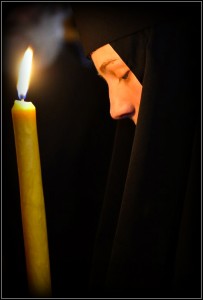 where any sentimental disappointment and aversion for life have disappeared. Virginity is the fruit of an inner life of high intensity, it is the unsatisfied thirst for beauty and liberty, it requires, according to St. John Chrysostom, a terrible energy and nerves of steel. The opinion that monasteries are full of misogynists, of impotents and fools who lacked food at home, is just as ridiculous as it sounds. In the traditional monasteries there is a synod of the elder monks who investigate the newcomer and nobody who expresses such motives for the abandonment of the world is received in the flock, much less is he tonsured a monk. Neither are received those with psychic problems for, in order to become a monk, much health is needed and psychic equilibrium in the first place.
where any sentimental disappointment and aversion for life have disappeared. Virginity is the fruit of an inner life of high intensity, it is the unsatisfied thirst for beauty and liberty, it requires, according to St. John Chrysostom, a terrible energy and nerves of steel. The opinion that monasteries are full of misogynists, of impotents and fools who lacked food at home, is just as ridiculous as it sounds. In the traditional monasteries there is a synod of the elder monks who investigate the newcomer and nobody who expresses such motives for the abandonment of the world is received in the flock, much less is he tonsured a monk. Neither are received those with psychic problems for, in order to become a monk, much health is needed and psychic equilibrium in the first place.
If virginity for its own sake would be worth something, then the suffering of theimpotents and castrates could not be accounted for. It is said that Origen castrated himself inorder to avoid this passion, but he only managed to worsen his suffering. Peace does not rest in our body, but in the hands of Christ. It is true that various sects split from the trunk of Christianity which, having a wrong understanding of the Savior’s words[8], used to castrate themselves.
People like these are rebuked by Paul the Apostle: “I could wish that those who trouble you would even cut themselves off!” (Galatians 5.12) “When He says ‘They made themselves eunuchs’, He does not speak of cutting off their members -God forbid!-, but of cutting off their wicked thoughts. For the one who mutilates himself is cursed… And on very good grounds! Such a man is a murderer; he makes it possible that God’s creation be slandered, opens the mouths of the Manicheans and commits the same lawlessness as the pagans who mutilate themselves.
Cutting off one’s members has been from the beginning the result of a demonic influence and of a satanic device, so that the work of God may be defamed and man may be marred, so that all weight would be cast on the nature of the members and not on free will.” [9]
The monks are well aware that people need sexual relationships, for this desire is both good and bad, according to St. John Chrysostom: “Both anger and desire are built into the human nature, … [and] both are useful to us… desire in order to give birth to children and preserve the human race through these descendants.” (same source as above) [10]
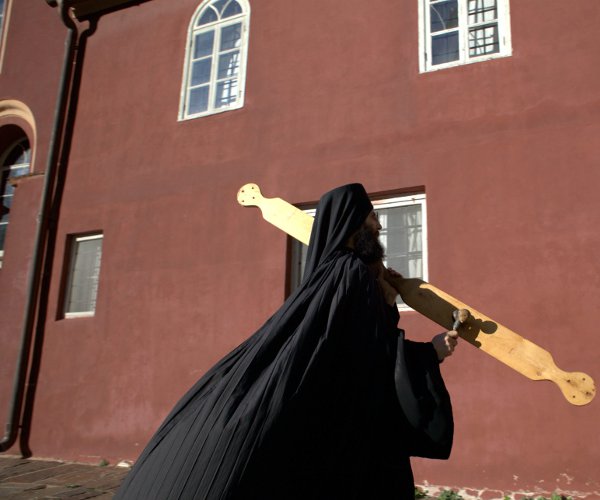 Those having spiritual Fathers at monasteries know that monks are even less strict with the canons than the ordinary priests, as they know what it means to fight a passion and how easy it is to fall. “Once they brought a girl having conceived to Abba Ammonas and they said to him: a certain one din this thing, give them a penance, that is, punishment for the sin! But him, making the sign of the cross on her womb, ordered that she be given some sheets, saying: for fear that, going away, she may give birth and will die, either her or the baby, and she may lack the necessary tings for burial. But her accusers said: why did you do that? Give them penance! But he said to them: you see, brothers, that she is close to death, and what can I do? And the elder let her go free and did not dare condemn anyone.” [11]
Those having spiritual Fathers at monasteries know that monks are even less strict with the canons than the ordinary priests, as they know what it means to fight a passion and how easy it is to fall. “Once they brought a girl having conceived to Abba Ammonas and they said to him: a certain one din this thing, give them a penance, that is, punishment for the sin! But him, making the sign of the cross on her womb, ordered that she be given some sheets, saying: for fear that, going away, she may give birth and will die, either her or the baby, and she may lack the necessary tings for burial. But her accusers said: why did you do that? Give them penance! But he said to them: you see, brothers, that she is close to death, and what can I do? And the elder let her go free and did not dare condemn anyone.” [11]
“For we know that the whole creation groans and labors with birth pangs together until now. Not only that, but we also who have the first fruits of the Spirit, even we ourselves groan within ourselves, eagerly waiting for the adoption, the redemption of our body.” (Romans 8.22-23)
Living for eternity and within eternity, the Orthodox ascetic is not lacking any of the enjoyments of the married life. He cannot either be considered a broken link in the chain of generations, who does not leave offspring behind him. Living for a spiritual God, within a spiritual universe, the monk gives birth spiritually to spiritual sons, preparing them for eternity. The number of spiritual sons a monk leaves behind exceeds by far the birth abilities of the
biological parents, for the monks not only give birth to hundreds and thousands of spiritual sons during their lifetime, but also after death, answering the prayers of the faithful, they give not only spiritual birth but, by their intercessions before God, they open the wombs of sterile women, literally engendering biological birth as well.
Aside from all these, the fruits of abstinence can be seen by everybody. The monks show longevity, freshness at all times, spirituality and peace. Elders like Frs. Cleopa, Arsenie Papacioc, Teofil Paraian of Romania are always surrounded by crowds of young people, usually college students, coming to hear their words and to rejoice spiritually together. These elders are loved by the children, by the simple folk of the countryside and by the university professors. From them receive women beaten by their husbands a comforting word, to them run children abandoned by their biological parents, under their old epitrakhilions weep poor college student girls wounded by abortions, abused by their lovers. Although having renounced family life, they rebuild broken families, bring children back to their parents, make peace between young couples. Thousands of pilgrims travel daily to see these happy abstinents.
The sexual relationship is neither food nor air, without which human life is made impossible. It is not what the body is lacking, but the simple act through which God decided to preserve life on earth. Children live happily without sexual relationships, state we are advised to aim for by our Savior. This is the initial state of Adam and Eve. This is the state Orthodox monks try to reach, by their way of life, opposing passionate thoughts which are the sole cause of every sickness and sorrow.
Abstinence is what gives us the likeness of Christ, of God, and therefore it gives those who practice it the sense of a higher nobility. Abstinents for Christ do this of their own free will, they are not forced by circumstances and therefore they cannot be compared with the frustrate Freudians.
They had the replacement option, they knew from practice what it means to exit time and step into eternity. These are the happy humans who managed to believe Christ more than Freud. They are those who jumped off the torture bed of the Jewish doctor and tried to see and to live otherwise, thing which they managed to do for the last two thousand years.
We know that abstinence goes against nature, namely the fallen nature, therefore practicing it means raising ourselves above these laws of nature, having true power. Many break their necks in this cosmological battle, many go down like exhausted birds in their trip to the warm countries. Many, however, come out as winners.
This is the mysterious faith of the Christians, who compete in this virtue with the billions of virginal angels. However, all these are only possible in the space of Christ, where no sexually impure can enter (Corinthians I, 6.9), where the pulleys of the natural laws get stuck by the hidden work of the Holly Spirit. On the other side remain fear and death.
References:
[ translator’s note: in some cases I am not sure what the English title is, so I show the Romanian version, with guessed English title added in brackets. In other cases (refs 5-8), where details are given about the specific Romanian edition used, I didn’t attempt to translate those. ]
- Mircea Eliade in “Istoria credinţelor şi ideilor religioase”, Vol. I. [ perhaps: History of Religious Faiths and Ideas ]
- Walter Otto in “Zeii Greciei – Imaginea divinităţii ξn spiritualitatea greacă”, Humanitas, 1995. [ perhaps: The Homeric Gods: Spiritual Significance of Greek Religion
- The closed regime monasteries are those not open to general visitors. The rules of thecongregation state that monks, although wearing modest clothing, to always keep them clean, so as not to scandalize the weak in the faith laics. Anyway, Christianity never saw a virtue in the fact that somebody abstains from washing, this is rather a consequence of a total dedication to prayer and meditation of some ascetics. Since monastic experience showed that many who embraced this way of life before going through the necessary preparation became insane, this practice is not only not recommended, but even prohibited by congregations observing a healthy tradition. Orthodox asceticism is profoundly different from that of Oriental faiths, which see the body as a useless wrapper of the soul, by the fact of not being aimed against the body, where each bodily canon should not go beyond its goal, namely to cool down the passions. According to Orthodox dogma, the soul is not superior to the body, nor is the body superior to the soul, but both, recovering their harmony, form the human being. Although there are many cases of sickness among monks due to excesses, either physical or sleep/food deprivation, these happen in the monasteries with unlearned hegumens, being themselves gravely deluded, in a state of insanity, suffering from what psychiatrists call religious delirium, something totally different from the genuine Orthodox monastic tradition. Healthy monasticism always has in mind the words of St. Paul the Apostle: “For we wrestle not against flesh and blood, but against principalities, against powers, against the rulers of the darkness of this world, against spiritual wickedness in high places.” Ephesians 6.12.”It was said of Abba Isidore that he has forty years of feeling sin with his mind, but never gave in, not to that of desire, nor to that of anger.” The Egyptian Paterikon, For Abba Isidore, no.3.
- For instance, this word from the teaching about watchfulness and virtue of St. Hesichios the Sinaite: “Therefore, one kind of watchfulness is to guard your imagination, that is the attack, so that, not having imagination at his disposal, Satan would not be able to produce false thoughts and offer them to the mind as a cunning deceit.” Filocalia, vol. IV, Ed. Hrisma, Bucureşti, 1994,
- 61.
- Plato, “The Republic”. Opere vol. V, Ed. Ştiinţifică şi enciclopedică, Bucureşti 1986, Partea I, 2, pp. 82-83.
- Palladius “The Lausiac History”, chapter 28. Ed. Inst. Biblic şi de Misiune al BOR, ξn traducerea Preotului Pr. Dr. Dumitru Stăniloae, Bucureşti, 1993, p. 65.
- Matthew 19.12
- St. John Chrysostom, Writings, Part 3, “Homilies to Mathew”. Transl. Pr. Dumitru Fecioru, Ed. Ist. Biblic şi de Misiune al BOR, Colecţia PSB 23, Bucureşti, 1994, p. 720-721.
- Ibid. pp.219.
“The Egyptian Paterikon”, For Abba Ammonas, no.8.
source: http://savatie.trei.ro/savatie/intre_Freud_si_Hristos.htm

